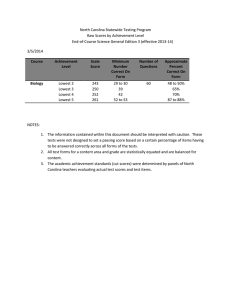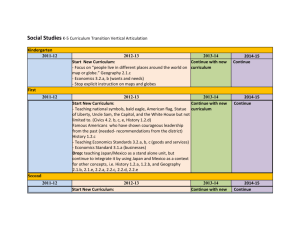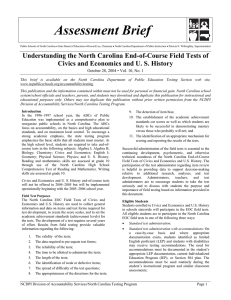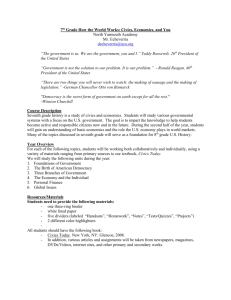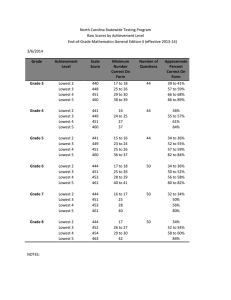North Carolina End-of-Course Test of Civics and Economics What is end-
advertisement
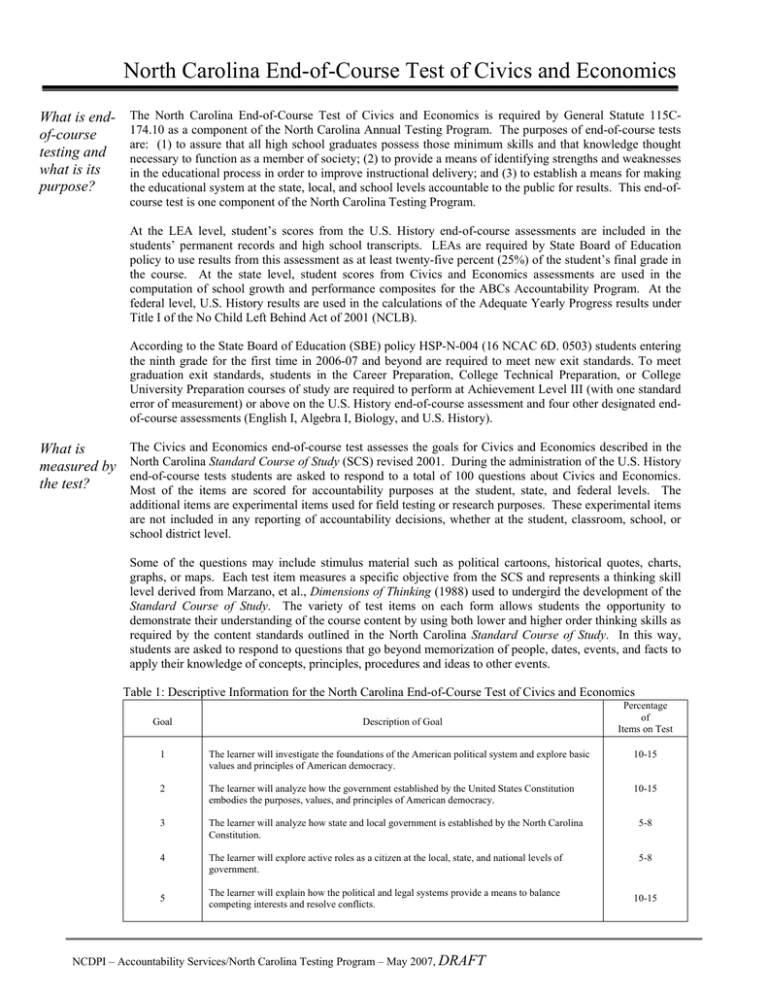
North Carolina End-of-Course Test of Civics and Economics What is endof-course testing and what is its purpose? The North Carolina End-of-Course Test of Civics and Economics is required by General Statute 115C174.10 as a component of the North Carolina Annual Testing Program. The purposes of end-of-course tests are: (1) to assure that all high school graduates possess those minimum skills and that knowledge thought necessary to function as a member of society; (2) to provide a means of identifying strengths and weaknesses in the educational process in order to improve instructional delivery; and (3) to establish a means for making the educational system at the state, local, and school levels accountable to the public for results. This end-ofcourse test is one component of the North Carolina Testing Program. At the LEA level, student’s scores from the U.S. History end-of-course assessments are included in the students’ permanent records and high school transcripts. LEAs are required by State Board of Education policy to use results from this assessment as at least twenty-five percent (25%) of the student’s final grade in the course. At the state level, student scores from Civics and Economics assessments are used in the computation of school growth and performance composites for the ABCs Accountability Program. At the federal level, U.S. History results are used in the calculations of the Adequate Yearly Progress results under Title I of the No Child Left Behind Act of 2001 (NCLB). According to the State Board of Education (SBE) policy HSP-N-004 (16 NCAC 6D. 0503) students entering the ninth grade for the first time in 2006-07 and beyond are required to meet new exit standards. To meet graduation exit standards, students in the Career Preparation, College Technical Preparation, or College University Preparation courses of study are required to perform at Achievement Level III (with one standard error of measurement) or above on the U.S. History end-of-course assessment and four other designated endof-course assessments (English I, Algebra I, Biology, and U.S. History). What is measured by the test? The Civics and Economics end-of-course test assesses the goals for Civics and Economics described in the North Carolina Standard Course of Study (SCS) revised 2001. During the administration of the U.S. History end-of-course tests students are asked to respond to a total of 100 questions about Civics and Economics. Most of the items are scored for accountability purposes at the student, state, and federal levels. The additional items are experimental items used for field testing or research purposes. These experimental items are not included in any reporting of accountability decisions, whether at the student, classroom, school, or school district level. Some of the questions may include stimulus material such as political cartoons, historical quotes, charts, graphs, or maps. Each test item measures a specific objective from the SCS and represents a thinking skill level derived from Marzano, et al., Dimensions of Thinking (1988) used to undergird the development of the Standard Course of Study. The variety of test items on each form allows students the opportunity to demonstrate their understanding of the course content by using both lower and higher order thinking skills as required by the content standards outlined in the North Carolina Standard Course of Study. In this way, students are asked to respond to questions that go beyond memorization of people, dates, events, and facts to apply their knowledge of concepts, principles, procedures and ideas to other events. Table 1: Descriptive Information for the North Carolina End-of-Course Test of Civics and Economics Goal Description of Goal Percentage of Items on Test 1 The learner will investigate the foundations of the American political system and explore basic values and principles of American democracy. 10-15 2 The learner will analyze how the government established by the United States Constitution embodies the purposes, values, and principles of American democracy. 10-15 3 The learner will analyze how state and local government is established by the North Carolina Constitution. 5-8 4 The learner will explore active roles as a citizen at the local, state, and national levels of government. 5-8 5 The learner will explain how the political and legal systems provide a means to balance competing interests and resolve conflicts. NCDPI – Accountability Services/North Carolina Testing Program – May 2007, DRAFT 10-15 Table 1: Descriptive Information for the North Carolina End-of-Course Test of Civics and Economics (continued) Goal 6 The learner will explain why laws are needed and how they are enacted, implemented, and enforced at the national, state, and local levels. 10-15 The learner will investigate how and why individuals and groups make economic choices. 10-15 The learner will analyze features of the economic system of the United States. 10-15 9 The learner will analyze factors influencing the United States economy. 10-15 10 The learner will develop, defend, and evaluate positions on issues regarding the personal responsibilities of citizens in the American constitutional democracy. 7 8 How is the test administered? Percentage of Items on Test Description of Goal 5-8 The North Carolina End-of-Course Test of Civics and Economics consists of 100 multiple-choice questions which are required by SBE policy to be administered within the last ten days (5 days for semester courses) of the course. These tests are untimed which allows students ample opportunity to demonstrate what they know and are able to do related to Civics and Economics concepts. Although the test administration for Civics and Economics is untimed, estimated timing is provided for scheduling purposes. During each administration, multiple equivalent forms of the test are administered in each classroom to measure the breadth and depth of the curricular requirements. The tests are scanned and scored locally which allows for timely reporting of results. In addition, test scores are aggregated and disaggregated at the North Carolina Department of Public Instruction to fulfill the state and federal reporting requirements for the accountability programs. How was the test developed? The questions on the Civics and Economics end-of-course test were written and reviewed by trained North Carolina teachers and educators. The questions were written to reflect the variety of conceptual expectations specified in the North Carolina Standard Course of Study for Civics and Economics. The test questions are written to reflect the principles of Universal Design to ensure accessibility for students with special needs. The questions chosen represent common, high frequency content that generally reflect expectations set forth by a high school Civics and Economics course. The questions were field tested during the fall of 2004 and the spring of 2005 as a statewide administration that involved approximately 90,000 students from schools across the state. The Civics and Economics test was implemented operationally statewide for the first time in the fall of 2005. What kinds of scores do students receive on the test? The scores on the North Carolina End-of-Course Test of Civics and Economics are reported as scale scores, achievement levels, and grades. The scale scores range from 117 to 181. The use of scale scores helps to make interpretation easier and more consistent from test to test. Achievement levels are also generated to provide an interpretation of student performance relative to a predetermined standard. Student scores are converted to one of the four achievement level categories shown below. In addition, student scores are reported as percentile ranks, which are generated from a statewide distribution of students who take the test during the first year the test is administered or the norming year. Table 2: Achievement Levels for the North Carolina End-of-Course Test of Civics and Economics Level I Description Achievement Level I Students performing at this level do not have sufficient mastery of knowledge and skills of the course to be successful at a more advanced level in the content area. Students performing at Level I are able to describe the impact of the founding of the American nation and government; identify the organization and structure of national, state and local governments; list the principles of American government; identify the purpose and function of the American legal system; identify methods of civic and economic participation; identify the functions of the American economy at the national and personal levels; and list fundamental economic concepts. NCDPI – Accountability Services/North Carolina Testing Program – May 2007, DRAFT Interim Scale Score Range Final Scale Score Range 117-139 Less than or equal to 140 Table 2: Achievement Levels for the North Carolina End-of-Course Test of Civics and Economics (continued) Level II Description Achievement Level II Students performing at this level demonstrate inconsistent mastery of knowledge and skills of the course and are minimally prepared to be successful at a more advanced level in the content area. Interim Scale Score Range Final Scale Score Range 140-148 141-147 149-158 148-159 159-181 Greater than or equal to 160 Students performing at Level II are able to explain the impact of the founding of the American nation and government; describe the roles of national, state and local governments; explain the principles of American government; explain the purpose and function of the American legal system; investigate opportunities for civic and economic participation; describe the functions of the American economy at the national and personal levels; and understand fundamental economic concepts. III Achievement Level III Students performing at this level consistently demonstrate mastery of the course subject matter and skills and are well prepared for a more advanced level in the content area. Students performing at Level III are able to analyze the impact of the founding of the American nation and government; analyze the organization and structure of national, state and local governments; apply the principles of American government to the functions of national, state, and local governments; analyze the purpose and function of the American legal system; investigate opportunities for civic and economic participation and apply learned skills and principles to various situations; explain the functions of the American economy at the national and personal levels; and apply fundamental economic concepts. IV Achievement Level IV Students performing at this level consistently perform in a superior manner clearly beyond that required to be proficient in the course subject matter and skills and are very well prepared for a more advanced level in the content area. Students performing at Level IV are able to analyze the impact of the founding of the American nation on the development of American government; evaluate the effectiveness of the organization and structure of national, state and local governments; assess the relationship between the principles of American government and the functioning of national, state, and local governments; evaluate the effectiveness of the American legal system in maintaining order and justice; determine the effectiveness of civic and economic participation as applied to learned skills and principles; evaluate the functions of the American economy at the national and personal levels; and analyze fundamental economic concepts. Sample Items On the following pages are samples of the types of items that appear on the North Carolina End-of-Course Test of Civics and Economics. The objective indicates the curriculum objective the item is designed to assess. The thinking skill corresponds to the level of thinking the item requires as defined by a thinking skills taxonomy adapted from Dimensions of Thinking by Robert J. Marzano and others. A description of the Thinking Skills used in the North Carolina Testing Program can be found on our web site at www.ncpublicschools.org/accountability /testing. Additional sample items of the types that appear on the North Carolina End-of-Course Test of Civics and Economics can be found at http://www.ncpublicschools. org/docs/accountability/testing/eoc/cnesampleitems.pdf. NCDPI – Accountability Services/North Carolina Testing Program – May 2007, DRAFT
